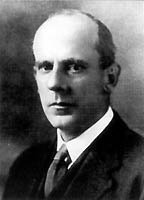Logan Waller Page
Logan Waller Page | |
|---|---|
 | |
| Director of Public Roads | |
| In office 1905 – December 9, 1918 | |
| Preceded by | Martin Dodge |
| Succeeded by | Thomas Harris MacDonald |
| Personal details | |
| Born | January 10, 1870 Richmond, Virginia |
| Died | December 9, 1918 (aged 48) Chicago, Illinois |
Logan Waller Page (January 10, 1870 – December 9, 1918) was an American administrator, who became the first Director of the newly created Office of Public Roads in 1905, after the US Congress passed an act that consolidated the Office of Public Inquiry and the Bureau of Chemistry.[1]
Five years earlier, Page, a geologist with the Massachusetts State Highway Commission, accepted the position of Chief of the Division of Tests in Washington. In this post, his responsibilities included a study of road building on a national scale. As a geologist in Massachusetts, he had conducted the first extensive investigation of road-building materials in America.
Later, as Chief of the Bureau of Chemistry, he began a series of investigations, which won international acclaim for the laboratories he directed.
Page introduced a scientific movement in road building that won enthusiastic national public support. He initiated "a petrographic study" of road-building materials; wrote the first comprehensive report on the elements of road-building rocks; and improved French rock-testing machines, whereby physical tests of road-building rocks became a routine procedure.
On December 9, 1918, Logan attended a meeting with Executive Committee of the American Association of State Highway Officials. Later that same day, he became ill during dinner and died a few hours later.[2]
References
- ^ "Administrators". US Federal Highway Administration. Retrieved 13 May 2017.
 This article incorporates text from this source, which is in the public domain.
This article incorporates text from this source, which is in the public domain.
- ^ "Public Roads - A Journey to Better Highways: 100 Years of Public Roads , Summer 2018 - FHWA-HRT-18-004".
[1] ![]() This article incorporates text from this source, which is in the public domain.
[2]
This article incorporates text from this source, which is in the public domain.
[2]
